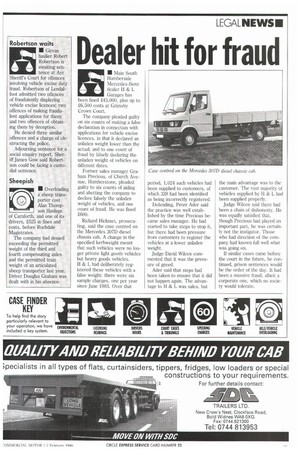Dealer hit for fraud
Page 19

If you've noticed an error in this article please click here to report it so we can fix it.
• Main South Humberside Mercedes-Benz dealer H & L Garages has been fined £45,000, plus up to £6,500 costs at Grimsby Crown Court.
The company pleaded guilty on six counts of making a false declaration in connection with applications for vehicle excise licences, in that it declared an unladen weight lower than the actual; and to one count of fraud by falsely declaring the unladen weight of vehicles on different dates.
Former sales manager Graham Precious, of Church Avenue, Humberstone, pleaded guilty to six counts of aiding and abetting the company to declare falsely the unladen weight of vehicles, and one count of fraud. He was fined £600.
Richard Hiclunet, prosecuting, said the case centred on the Mercedes 307D diesel chassis cab. A change in the specified kerbweight meant that such vehicles were no longer private light goods vehicles but heavy goods vehicles. H & L had deliberately registered these vehicles with a false weight: there were six sample charges, one per year since June 1983. Over that period, 1,024 such vehicles had been supplied to customers, of which 328 had been identified as being incorrectly registered.
Defending, Peter Ader said the practice was well established by the time Precious became sales manager. He had started to take steps to stop it, but there had been pressure from customers to register the vehicles at a lower unladen weight.
Judge David Wilcox commented that it was the pressure of greed.
Ader said that steps had been taken to ensure that it did not happen again. The advantage to H & L was sales, but the main advantage was to the customer. The vast majority of vehicles supplied by H & L had been supplied properly.
Judge Wilcox said there had been a chain of dishonesty. He was equally satisfied that, though Precious had played an important part, he was certainly not the instigator. Those who had direction of the company had known full well what was going on.
If similar cases came before the court in the future, he continued, prison sentences would be the order of the day. It had been a massive fraud, albeit a corporate one, which no society would tolerate.
































































































































